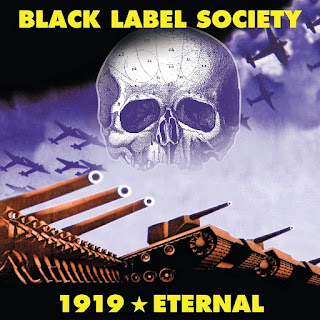V2.23
Nobody – and I mean nobody – can shred a set of guitar strings like Zakk Wylde. An instrumental madman, Wylde coaxes noises out of his axe that even Jimi Hendrix only imagined. The New Jersey native’s guttural, bass-heavy vocal style sounds like something straight out of Dante’s worst nightmares. Both traits are perfectly suited to the manic heavy metal style that Wylde performs, the maestro’s talents illustrated with great clarity by 1919 Eternal (Spitfire Records) from Wylde’s Black Label Society.
Wylde made his bones as the lead guitarslinger in Ozzie Osbourne’s late-eighties band, replacing popular Osbourne foil Randy Rhode after his death. After working with Ozzie on a number of albums and accompanying tours, Wylde struck out on his own, first forming Pride And Glory and later putting together the musical wrecking crew known as the Black Label Society. Wylde reunited with his mentor for Ozzie’s excellent 2001 release Down To Earth; it was during sessions for that album that many of the songs found on 1919 Eternal were written.
Metalheads that prefer Wylde’s guitar-heavy style above Ozzie’s relatively tame sound need not fear. 1919 Eternal has a little of everything that you love Zakk Wylde for – rampaging riffs, powerful rhythms and the staccato-like sound of notes being drilled into your brain through your ears. Tunes like “Battering Ram,” “Genocide Junkies” or “Lords of Destruction” lay a mighty smackdown on the listener. Honorary BLS bassist Robert Trujillo and tag-team drummers Christian Werr and Craig Nunemacher struggle at times to keep up with Wylde’s aural assault, the magnificent bastard spreading layer upon layer of stinging guitars and throbbing bass above his somber vocals. 1919 Eternal is a rock-solid collection of songs, pyrotechnic performances your parents are certain to hate, your enemies will fear and your friends will listen to with awe.
One of the most criminally-overlooked British bands to enjoy a stateside cult following, The Chameleons U.K. continue to be ignored by a mainstream audience in favor of flashier, less-talented outfits with better press agents. Since 1981, however, the band has quietly, and without fanfare, trickled out a handful of lush, textured albums that have withstood the test of time to become true classics of the pop/rock genre. Reuniting to record their first studio album in fifteen years, the Manchester quartet has created a powerful musical statement in Why Call It Anything (Cleopatra Records).
The music of the Chameleons U.K. has always seemed more about tone rather than cheap hooks and a catchy chorus, every song awash with ringing six-string and driving rhythms. Why Call It Anything carries on in this tradition, guitarists Reg Smithies and Dave Fielding, drummer in John Lever and vocalist/bassist Mark Burgess weaving an extraordinary, mesmerizing tapestry of sound on songs like “Lufthansa” and “Dangerous Land.” Burgess’ friendly vocals are threaded throughout the songs on Why Call It Anything, sometimes lost in the mix while other times soaring high above the melodic din. The Chameleons U.K. don’t so much build a wall-of-sound in the studio – an overdone trick – rather they cement all of the cracks and crevices with a joyful noise, creating a seamless texture to their material. Overlooked even in critical circles, the Chameleons U.K. are worth another listen, Why Call It Anything as good a place as any to start.
Tommy Walter left behind a promising future as a member of Eels, his musical contributions to their 1996 debut Beautiful Freak certainly helping cement the enigmatic trio’s rep as critical favorites. Walter left Eels after that album, preferring to forge his own path across the musical landscape, which has brought him to Abandoned Pools. Essentially, Tommy Walter is Abandoned Pools, the multi-instrumental talent playing almost every instrument on Humanistic (Extasy Records). Wearing his heart (and musical influences) on his artistic sleeve, Walter has delivered a debut that is full of potential.
Working with famed alt-rock producers Paul Q. Koderie and Sean Slade, Walter has crafted a careful selection of songs for Humanistic. Adding a soupcon of Britpop, a measure of hard-rock distortion and a spoonful of blue-eyed soul, Walter blends the disparate styles into an entertaining musical experience. Kurt Cobain is Walter’s most obvious influence, the former Nirvana frontman’s personalized angst and stuttering musical style mimicked by Walter on songs like “Blood” or “L.V.B.D.” Whereas Cobain drew his inspiration solely from the punk and heavy metal bands he listened to as a teen, Walter’s Beatlesque pop roots keep his songs from veering off the road onto darker musical trails. Humanistic is an ambitious, multi-layered album that takes a spin or two to develop a taste for. Once you embrace the new pop aesthetic created by Tommy Walter, however, you’ll wonder what you ever did without it.
Kim Cooper is the editor of Scram, an intelligent and entertaining publication that covers the complete spectrum of pop culture. As a long-time reader and fan of Scram, I can’t think of another writer that could have exceeded Cooper’s efforts as editor of Bubblegum Music Is the Naked Truth (Feral House). Subtitled “The Dark History of Prepubescent Pop,” the book is the ultimate authority on this often-maligned and popular, if overlooked genre of music. Along with co-editor David Smav, Cooper has assembled an impressive roster of contributors, writers like Lisa Sutton, Metal Mike Saunders, Dave Thompson, and Chuck Eddy. From the people who made the music, like the Ohio Express, the 1910 Fruitgum Company and the Cowsills to the producers and writers like Boyce and Hart, Neil Bogart, and Jeff Barry who shaped the history of bubblegum, you’ll find them all here. (The View On Pop Culture, March 2002)



No comments:
Post a Comment